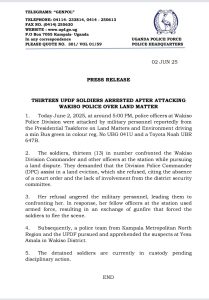Police have confirmed the arrest of thirteen Uganda People’s Defence Forces (UPDF) soldiers following a violent confrontation with officers at Wakiso Police Division headquarters on Monday evening.
The soldiers are accused of attempting to enforce an unlawful land eviction.
According to a police press statement issued on June 2, 2025, the incident occurred at around 5:00 PM when the armed soldiers reportedly attached to the Presidential Taskforce on Land Matters and Environment stormed the police station in two vehicles, a green minibus (registration number UBG 041U) and a Toyota Noah (UBR 647B).
“The soldiers, thirteen (13) in number, confronted the Wakiso Division Commander and other officers at the station while pursuing a land dispute,” the statement reads.
The military personnel reportedly demanded assistance from the Division Police Commander (DPC), SP Esther Kiiza, to carry out an eviction.
However, SP Kiiza refused, citing the absence of a valid court order and the lack of authorization from the district security committee.
“Her refusal angered the military personnel, leading them to confront her,” police said. “In response, her fellow officers at the station used armed force, resulting in an exchange of gunfire that forced the soldiers to flee the scene.”
A swift joint operation by the Kampala Metropolitan Police North Region and the UPDF was launched shortly after, resulting in the suspects being apprehended at Yesu Amala, within Wakiso District.
Police confirmed that the arrested soldiers are currently in custody as investigations continue, and disciplinary action is expected.
This incident adds to growing concerns about the increasing frequency of violent land disputes in the country and the tensions such disputes are creating between security agencies.
Authorities reaffirmed their commitment to lawful procedures in handling land matters. “No one is above the law,” a police spokesperson emphasized. “Evictions must follow due process and be sanctioned by the appropriate authorities.”